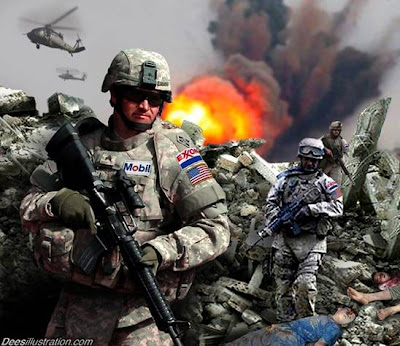TONIGHT ON THE TERRORDOME: War is a Force that Gives Us Meaning
cjsr.com Worldwide
FM 88.5 Edmonton
6 pm Mountain Time
 When we talk of heroes and icons, we use the language of war. People in search of justice are said to fight “the good fight,” to be battlers and “street-fighting men.”
When we talk of heroes and icons, we use the language of war. People in search of justice are said to fight “the good fight,” to be battlers and “street-fighting men.”
FM 88.5 Edmonton
6 pm Mountain Time
 When we talk of heroes and icons, we use the language of war. People in search of justice are said to fight “the good fight,” to be battlers and “street-fighting men.”
When we talk of heroes and icons, we use the language of war. People in search of justice are said to fight “the good fight,” to be battlers and “street-fighting men.”We speak of crusades and even holy wars, of vanquishing evil and conquest. Martin Luther King Jr., the consummate pacifist, has been called a “warrior for peace.” There are books with ironic titles such as The Way of the Peaceful Warrior.
Even while hailing peace, we seem so enraptured with war that we fail to use metaphors suggesting creation, procreation, birth, production, engineering, teaching or artistry. We conceive of athletes such as ballplayers as heroes, even though heroes risk their privileges and their lives for other people’s betterment, whereas athletes are simply entertainers.
Why? Because the physical clashing of bodies speaks to us of war. And that’s why runners and swimmers are rarely called sports heroes: it’s the sports that offer the potential for collision, or which promise it--hockey, football, boxing—that we associate most with sports heroism.
Why? Because the physical clashing of bodies speaks to us of war. And that’s why runners and swimmers are rarely called sports heroes: it’s the sports that offer the potential for collision, or which promise it--hockey, football, boxing—that we associate most with sports heroism.
We revel in our mythological heroes of old and our superheroes of modern comic books and screens because they can perform physical feats—especially the punishment of evil doers—with strength, endurance and grace that elude us. We yearn to have the capacity for violence in our grasp.
Our evolution is intimately connected with our capacity for violence: to kill predators, to kill prey, and to kill competitors for our prey.
Yet it’s just as true, if not more so, that our evolution is intimately connected with our capacity to care, to treasure, to cultivate, to reason, to heal, to comfort and to love.
Yet it’s just as true, if not more so, that our evolution is intimately connected with our capacity to care, to treasure, to cultivate, to reason, to heal, to comfort and to love.
So why is it so easy for us to use the phrase “Well, that’s human nature for you” when we want to point out evil, when it should be just as easy if not easier to use the phrase when we witness a mother nursing her baby, a father wiping away his son’s tears, a young artist achieving beauty, or a physicist revealing the structure of existence?
How did we learn to think of ourselves as killers and destroyers, and to equate those roles with heroism?
How did we come to believe that the ultimate deployment of violence—war, the greatest drain of resources in human history, the biggest scam ever foisted upon our species—gives us meaning?
 Discussing this question tonight is veteran journalist Chris Hedges. At one time a seminarian, Hedges became a journalist and eventually a senior fellow at the Nation Institute.
Discussing this question tonight is veteran journalist Chris Hedges. At one time a seminarian, Hedges became a journalist and eventually a senior fellow at the Nation Institute.
 Discussing this question tonight is veteran journalist Chris Hedges. At one time a seminarian, Hedges became a journalist and eventually a senior fellow at the Nation Institute.
Discussing this question tonight is veteran journalist Chris Hedges. At one time a seminarian, Hedges became a journalist and eventually a senior fellow at the Nation Institute.He’s worked in more than 50 countries across the world as a correspondent, putting in fifteen years with The New York Times alone, for which he served as Middle East Bureau Chief.
Well-versed in English literature, Hedges is also a fluent speaker of Arabic, French, Spanish, Greek and Latin. With his colleagues Hedges earned a Pulitzer Prize in 2002. His solo work achieved him the 2002 Amnesty International Global Award for Human Rights Journalism. His opposition to the American illegal invasion of Iraq forced him to resign from The New York Times in 2003.
 Hedges is the author of several books including the recent Empire of Illusion: The End of Literacy and the Triumph of Spectacle and American Fascists: The Christian Right and the War on America.
Hedges is the author of several books including the recent Empire of Illusion: The End of Literacy and the Triumph of Spectacle and American Fascists: The Christian Right and the War on America.
 Hedges is the author of several books including the recent Empire of Illusion: The End of Literacy and the Triumph of Spectacle and American Fascists: The Christian Right and the War on America.
Hedges is the author of several books including the recent Empire of Illusion: The End of Literacy and the Triumph of Spectacle and American Fascists: The Christian Right and the War on America.His volume War is a Force that Gives Us Meaning exclaims Hedges’ experiences in numerous war zones, and his conclusions about the futility of evil of civilisation’s most destructive activity—one that Hedges compares to an addiction.


Comments